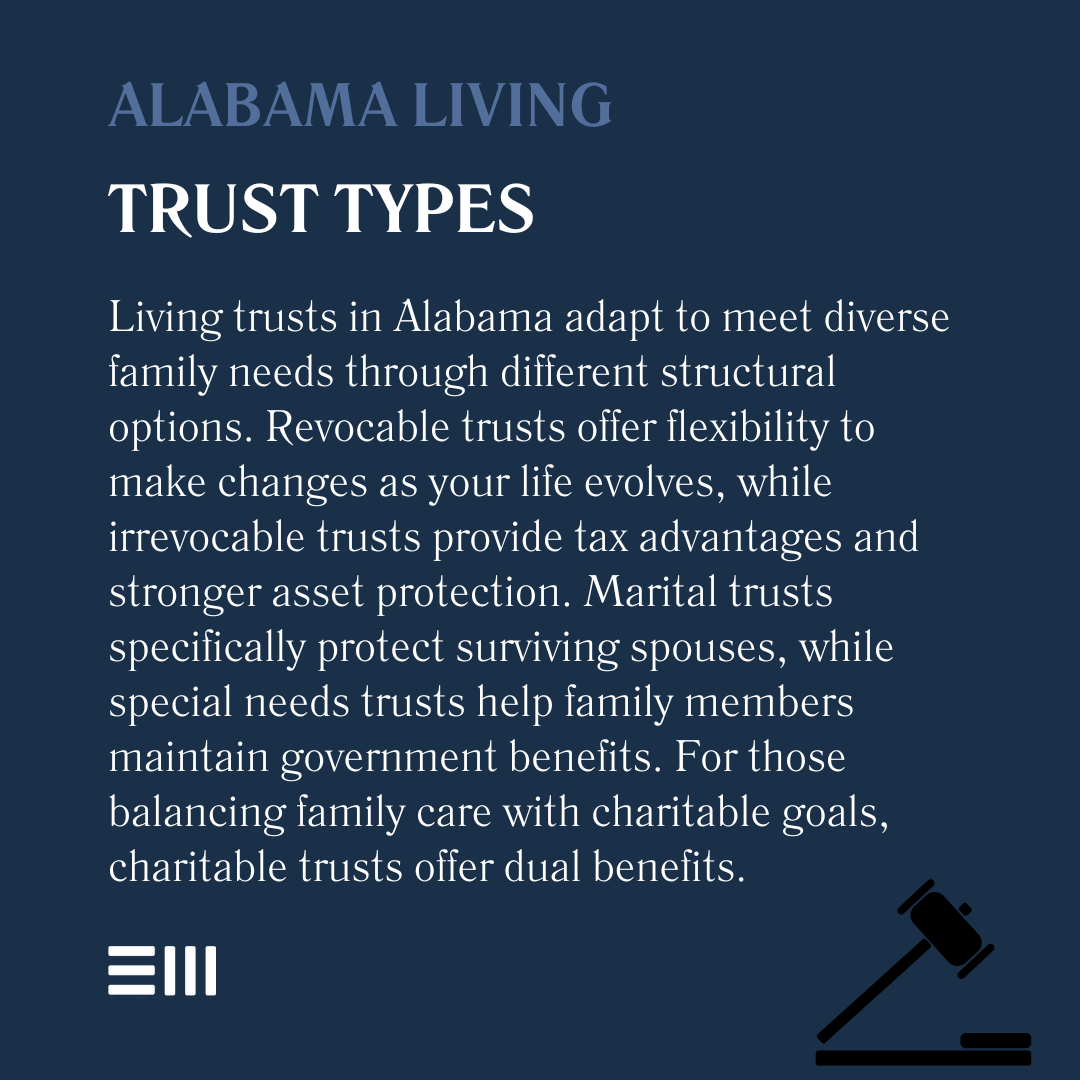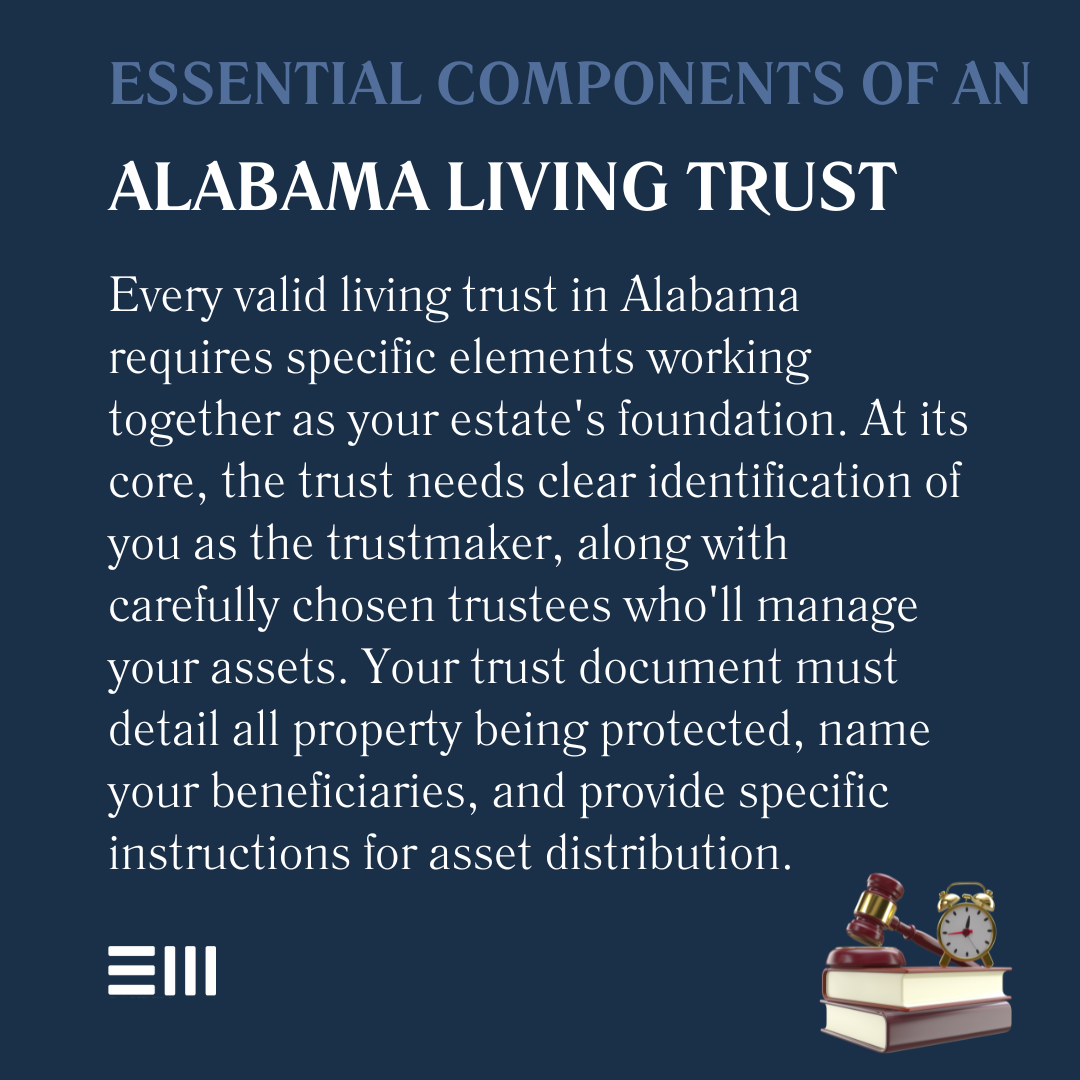Family stories often begin around kitchen tables in Alabama homes, where parents and grandparents share wisdom about protecting what matters most.
Among these conversations, the decision to create a living trust emerges as a powerful way to preserve not just assets but family harmony and peace of mind.
Beyond the simple transfer of wealth, a living trust weaves together your family's past and future, ensuring your legacy continues exactly as you envision.
Living trusts offer a clear path forward for Alabama families seeking to maintain privacy and control while minimizing future complications for their loved ones.
Understanding Living Trusts in Alabama
A living trust serves as your family's financial shield, protecting assets and providing clear direction for their management during your lifetime and beyond.
These legal arrangements hold unique advantages under Alabama law, particularly in preserving family privacy and avoiding the public nature of probate proceedings.
Types of Living Trusts Available in Alabama
Alabama recognizes several forms of living trusts, each designed to meet different family and financial needs.
Consider these options carefully as they form the foundation of your estate plan.
- Revocable living trusts allow changes throughout your lifetime, offering maximum flexibility for evolving family needs;
- Irrevocable living trusts offer tax advantages and asset protection, particularly valuable for high-net-worth estates;
- Marital trusts provide specific benefits for surviving spouses, including potential tax advantages;
- Special needs trusts protect beneficiaries who receive government benefits while maintaining their eligibility;
- Charitable trusts balance family needs with philanthropic goals, offering potential tax benefits;
- Spendthrift trusts protect beneficiaries from creditors and provide structured distributions;
- Generation-skipping trusts preserve wealth across multiple generations while minimizing tax implications;
- Asset protection trusts shield wealth from future creditors while maintaining family control;
- Educational trusts specifically designate funds for educational expenses; and
- Pet trusts ensure continued care for beloved animals after the owner's passing.
Understanding these options helps families select the trust structure that best serves their unique circumstances and goals.
Essential Components of an Alabama Living Trust
Creating an effective living trust requires careful attention to several key elements:
- Clear identification of the trustmaker (grantor) and their powers;
- Designation of trustworthy trustees and successors with specific duties outlined;
- Detailed inventory of assets to be placed in trust with proper valuation;
- Specific beneficiary designations and distribution terms including contingent beneficiaries;
- Powers granted to trustees for investment and distribution decisions;
- Provisions for incapacity including healthcare decisions;
- Instructions for trust administration and expense management;
- Tax planning considerations for various scenarios;
- Asset management guidelines including investment restrictions;
- Distribution schedules and triggering events;
- Dispute resolution procedures;
- Amendment and termination provisions;
- Accounting requirements; and
- Privacy protection measures.
These components create a comprehensive framework that ensures your trust operates effectively both during your lifetime and after your passing.
Alabama-Specific Trust Considerations
Understanding Alabama's unique legal landscape helps ensure your trust provides maximum benefit.
State Tax Implications
Alabama's tax structure affects trust planning in several ways:
- No state estate tax provides planning flexibility;
- Income tax considerations for trust earnings;
- Property tax implications for trust-held real estate;
- Generation-skipping transfer tax coordination;
- Gift tax integration with federal provisions;
- Business interest transfer taxation;
- Charitable deduction opportunities;
- Basis step-up considerations;
- Tax reporting requirements; and
- Future tax law changes.
Understanding these tax implications helps optimize trust structure for maximum benefit.
Property Law Considerations
Alabama property law affects trust creation and funding:
- Real property transfer requirements;
- Homestead protection rules;
- Mineral rights handling;
- Community property treatment;
- Joint ownership conversion;
- Business interest transfer rules;
- Agricultural land considerations;
- Historic property provisions;
- Environmental compliance; and
- Zoning implications.
These property law aspects require careful consideration during trust creation.
Steps to Create Your Living Trust
The process of establishing a living trust in Alabama follows specific legal requirements to ensure validity and effectiveness.
Initial Planning Phase
Before drafting trust documents, gather essential information:
- Complete asset inventory including current valuations;
- Family financial needs assessment for immediate and future requirements;
- Tax implications review with professional advisors;
- Beneficiary considerations including special needs;
- Trustee selection criteria and backup options;
- Healthcare directives integration with trust provisions;
- Insurance policy coordination and beneficiary alignment;
- Business succession plans if applicable;
- Charitable giving goals and tax implications;
- Investment strategy alignment with trust purposes;
- Family discussion planning;
- Professional advisor coordination;
- Document gathering requirements; and
- Timeline establishment.
Thorough preparation ensures your trust aligns with your overall estate planning objectives and family needs.
Legal Requirements in Alabama
Alabama law sets specific standards for living trust creation:
- Written trust document following state requirements;
- Proper execution and notarization procedures;
- Legal capacity of the grantor verified;
- Valid trust purpose clearly stated;
- Identifiable beneficiaries properly named;
- Funding provisions clearly outlined;
- Successor trustee designations with alternates;
- Distribution instructions in detail;
- Amendment procedures specified;
- Termination conditions defined;
- Recording requirements met;
- Notice provisions included;
- Accounting requirements specified; and
- Privacy protections established.
Meeting these requirements establishes a strong foundation for your trust's validity and effectiveness
Ongoing Trust Maintenance
Regular trust review and maintenance ensures continued effectiveness:
- Annual asset review and revaluation;
- Beneficiary designation updates;
- Tax planning adjustments;
- Investment strategy review;
- Distribution schedule assessment;
- Trustee performance evaluation;
- Legal compliance verification;
- Document updates as needed;
- Family communication maintenance; and
- Professional advisor coordination.
Proper maintenance helps your trust continue serving its intended purpose.
Funding Your Living Trust
A trust without assets offers no protection. Understanding the funding process helps ensure your trust works as intended.
Assets to Consider for Trust Funding
Review these common assets for potential trust inclusion:
- Real estate holdings including primary residence;
- Bank accounts and certificates of deposit;
- Investment portfolios including stocks and bonds;
- Business interests and partnerships;
- Life insurance policies and annuities;
- Retirement accounts with beneficiary considerations;
- Personal property including collections;
- Vehicles and recreational equipment;
- Art collections and valuables;
- Intellectual property rights
- Future inheritances;
- Oil and mineral rights;
- Agricultural assets; and
- Digital assets.
Careful consideration of each asset's nature helps determine appropriate trust funding strategies.
Funding Methods and Timing
Different assets require different funding approaches:
- Real estate deed transfers;
- Account retitling procedures;
- Stock certificate transfers;
- Business interest assignments;
- Vehicle title transfers;
- Personal property assignments;
- Beneficiary designation updates;
- Digital asset access provisions;
- Future asset funding instructions; and
- Contingent interest transfers.
Understanding these methods ensures proper trust funding completion.
Trust Operation and Management
Effective trust operation requires understanding several key areas:
Trustee Responsibilities
Trustees must fulfill specific duties:
- Asset management and protection;
- Investment decision making;
- Distribution management;
- Tax compliance;
- Beneficiary communication;
- Record keeping requirements;
- Professional advisor coordination;
- Dispute resolution handling;
- Amendment implementation; and
- Successor preparation.
Understanding these responsibilities helps trustees serve effectively.
Frequently Asked Questions About Alabama Living Trusts
Alabama residents often seek clarity about living trusts.
Here are answers to common questions about establishing and maintaining these important estate planning tools.
How Much Does It Cost to Create a Living Trust?
Living trust costs vary based on complexity, assets involved, and legal assistance needed. Initial setup typically ranges from basic document preparation to comprehensive estate planning services. Consider both immediate and ongoing maintenance costs.
Can I Create a Living Trust Without an Attorney?
While self-help options exist, Alabama's complex property laws and trust requirements often benefit from professional legal guidance to ensure validity and effectiveness. Attorney assistance helps avoid costly mistakes and ensures proper implementation.
How Long Does It Take to Set Up a Living Trust?
The process typically spans several weeks, including asset inventory, document preparation, and trust funding steps. Complex estates may require additional time for proper structuring and funding completion.
What Happens to My Trust After I Die?
Your successor trustee manages and distributes trust assets according to your instructions, typically without court intervention. The process includes asset inventory, debt settlement, tax compliance, and distribution management.
Can I Change My Trust Later?
Revocable trusts allow modifications during your lifetime, while irrevocable trusts generally permit limited or no changes after creation. Understanding modification options helps in initial trust selection.
How Does a Living Trust Affect My Taxes?
Tax implications vary by trust type and structure. Revocable trusts generally have no immediate tax impact, while irrevocable trusts may offer tax advantages but require careful planning.
Plan Your Legacy Today
Creating a living trust represents a significant step toward protecting your family's future.
Our experienced estate planning attorneys understand Alabama's specific requirements and can help design a trust that achieves your goals while providing peace of mind.
Contact our office today for a confidential consultation about your estate planning needs and discover how we can help secure your family's financial future through a carefully crafted living trust.


